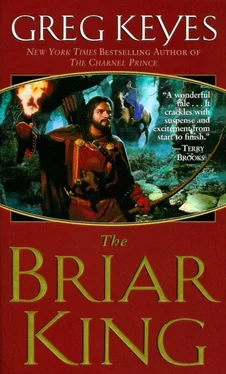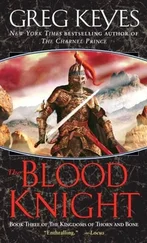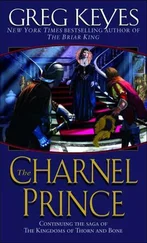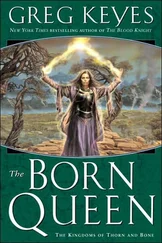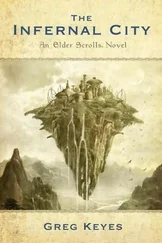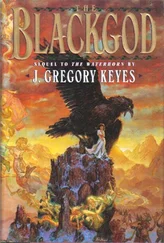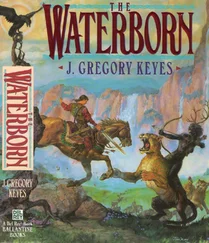Gregory Keyes - The Briar King
Здесь есть возможность читать онлайн «Gregory Keyes - The Briar King» весь текст электронной книги совершенно бесплатно (целиком полную версию без сокращений). В некоторых случаях можно слушать аудио, скачать через торрент в формате fb2 и присутствует краткое содержание. Жанр: Фэнтези, на английском языке. Описание произведения, (предисловие) а так же отзывы посетителей доступны на портале библиотеки ЛибКат.
- Название:The Briar King
- Автор:
- Жанр:
- Год:неизвестен
- ISBN:нет данных
- Рейтинг книги:5 / 5. Голосов: 1
-
Избранное:Добавить в избранное
- Отзывы:
-
Ваша оценка:
- 100
- 1
- 2
- 3
- 4
- 5
The Briar King: краткое содержание, описание и аннотация
Предлагаем к чтению аннотацию, описание, краткое содержание или предисловие (зависит от того, что написал сам автор книги «The Briar King»). Если вы не нашли необходимую информацию о книге — напишите в комментариях, мы постараемся отыскать её.
The Briar King — читать онлайн бесплатно полную книгу (весь текст) целиком
Ниже представлен текст книги, разбитый по страницам. Система сохранения места последней прочитанной страницы, позволяет с удобством читать онлайн бесплатно книгу «The Briar King», без необходимости каждый раз заново искать на чём Вы остановились. Поставьте закладку, и сможете в любой момент перейти на страницу, на которой закончили чтение.
Интервал:
Закладка:
An instant of silence followed that, as they politely struggled with the concept of a squire with no birth claim to knighthood.
“Well,” Sir Ferghus said, breaking the silence. “You are most welcome in our company. The recommendation of Sir Fail de Liery is better than the blood of ten noble houses.”
As they drank, Neil thought that perhaps some of Lonceth’s squires did not agree but were too polite to say anything.
“Tell me, Sir Ferghus,” Sir Fail said, once the toast had gone around. “I’ve heard little of your illustrious uncle. How does he find Paldh?”
The two knights talked for some time after that, and the squires, as was meet, stayed quiet. Most of Lonceth’s men drank heavily. Neil, as was his custom, did not.
When a lull came in the conversation, Neil tapped his master on the shoulder.
“I would check on the horses, Sir Fail,” he said. “Hurricane and Sunstamper both were having trouble with their land legs.”
Fail looked at him with a slightly suspicious smile. “See to it, then. But hurry back.”
The two horses were fine, as Neil knew they would be. And the massive, blue-eyed Hansan and two of the other Hanzish squires were waiting for him in the street—also as he knew they would be.
4
The Novice
Aspar awoke in the sure grasp of a tyrant, and to music. The music was a wild one—drumming of a woodpecker, the lark’s trilling melody rising above, the drifting, whirring chords of cicadas beneath. He rubbed dream grit from his eyes, braced his hands on the narrow wooden platform, and sat up carefully to greet the quick of dawn.
A wind soughed through the tyrants as they stretched their ancient, creaking limbs to the morning, clucked their smaller branches, bruised a few leaves into giving up their green, peppery scent.
Below, Ogre whickered. Aspar leaned from his perch to gaze at the faraway ground, to see that both his mounts were where he’d left them the evening before. From his prospect they seemed no larger than dogs.
The woodpecker drummed again as Aspar loosened his joints for the climb down. He had overslept on purpose this time. He liked to be in the branches when the first bronze of the sun came slanting through and the forest hummed and grumbled to life. This ancient stand he called the tyrants was one of the few places he could do that. In other places, centuries of fire, logging, and disease left at best one or two of the ancient ironoaks towering over lesser trees. Here they stood proud and unchallenged for leagues, ancient, titanic wrestlers, their muscular arms intertwined, gripping and pulling at each other, holding up a world in itself. A man could be born, live, and die up here, drinking the dew that gathered in mossy recesses, eating shelf fungus and squirrel or the flightless branch quail that ran peeping along the great boughs.
The world below—the world of Man and Sefry—did not matter up here.
Or so he had believed when he was a boy, when he discovered this place and built his first platforms. He’d imagined then that he would live here.
But even the tyrants could be chopped down or burned. Even the eternal could be killed by a hungry charcoal burner or for a nobleman’s whim. He had seen it, the boy Aspar had been. It was one of the few times in his life he had cried. That was when he knew he wanted to be a holter.
The King’s Forest, bah. The boy back at the inn was right about that at least. The king came here once or twice a year to hunt. This was Aspar’s forest. His to protect.
And something was happening out here. The Sefry were liars, yes, and not to be trusted. But if they really were fleeing the forest, with its deep sunless shadows and myriad caves, there had to be a reason for it. The Sefry did not step into the sun lightly.
So, reluctantly he made sure he had everything and started back down, limb to limb, to where the lowest branches, too heavy to keep themselves up, slopped in mazy, ropy paths to earth, there to put down new roots.
That was why Aspar called them tyrants; beneath their shading, creeping branches, no other green thing could live, save moss and a few ferns.
But deer and elk could survive, on the ankle-deep acorns, and the dappled cats that hunted them, like the lithe specimen he saw giving him a wary look from a few branches over. This one was small, just triple the size of a village tabby. In the Mountains of the Hare there were still lions, and here a few panthers worthy of note. But they wouldn’t bother him.
Ogre gave him a cross look as he stepped onto the black leaf mold. Angel tossed her head in greeting.
“Don’t look at me like that, you nag,” Aspar grunted at Ogre. “You’ve had the night to roam. You want me to start tethering you or keeping you hobbled?”
Ogre continued to glare, but he let Aspar mount, and picking their way through roots that sometimes mounded as high as the horses’ shoulders, they walked leisurely back to the Old King’s Road, a wide track that ran along a series of low ridges. In places it had been built up with stone and embanked, so it stood above the roots. Low branches had been cut away, allowing wagons to pass. To Aspar, the Old King’s Road was an affront, a leagues-long gash in the living forest. Still, it seemed unlikely that the tyrants would notice such a minor injury.
Midday he grew thirsty. He dismounted and made his way down a slope to where he knew a spring was—no point in wasting what he had bottled. Besides, springborn water was clean and cold, better than the flat rain-gathered stuff from the village. He found the stream bubbling from a sandy dish below a low cleft of crumbling rock, from whence it ran for a few large man’s jumps into Edwin’s Brooh. He knelt at the spring pan, cupping his hands, and then stopped still as a statue, trying to understand what he saw.
The natural basin was about as wide as his forearm, and water trickled cheerfully into it, as usual. But the pan seethed with black-peeping frogs scrambling away from his approach. A half dozen of them lay belly-up in the pool.
Nor were they alone. A yard-long creek-eel lay putrefying, its eyes filmed blue. Several large croaker-frogs sat there, too. All of them were alive, but they didn’t look healthy, nor did they even try to flee.
Aspar backed away from the spring, his stomach feeling funny. In all his years, he had never seen such a sight.
After a moment, he walked the rivulet’s length, down to where it met the brooh. All the way down it was clogged with dead frogs and, in its lower reaches, fish.
There were dead fish in the brooh, too, big ones, fetched up against the ferny banks or caught in natural weirs of sticks and roots.
The chill in his bones deepening, he unlimbered his bow and strung it, then started upstream. Something had poisoned the brooh, somehow, and its creatures had sought up to the springhead for cleaner water. There were folk who used the root of the sawbriar to stun fish to make them easy for the catching, but that worked only in a small, still pool. To kill a whole brooh would take more sawbriar than there was in the world.
The dead fish continued for a hundred paces, then a hundred more, and he was just about to return for his horses when he noticed that the stream had become clear again. He went a bit farther, to make sure, then backtracked, and on this pass noticed something else. A clump of ferns on the side of the stream had a distinct yellow cast to them. As if they, like the fish and frogs, were dying.
It was next to the ferns that he found the print.
Prints didn’t take well in the dense leaf mold of the forest floor, but on the muddy verge of the stream he found the impression of a paw. Though water had filled it and softened its outlines, it looked essentially like a cat track. But no dappled cat paw made this, nor even a panther. Aspar’s hand would just barely cover it. Even the lions of the Mountains of the Hare didn’t get that big. If this track belonged to a cat, it was bigger than a horse.
Читать дальшеИнтервал:
Закладка:
Похожие книги на «The Briar King»
Представляем Вашему вниманию похожие книги на «The Briar King» списком для выбора. Мы отобрали схожую по названию и смыслу литературу в надежде предоставить читателям больше вариантов отыскать новые, интересные, ещё непрочитанные произведения.
Обсуждение, отзывы о книге «The Briar King» и просто собственные мнения читателей. Оставьте ваши комментарии, напишите, что Вы думаете о произведении, его смысле или главных героях. Укажите что конкретно понравилось, а что нет, и почему Вы так считаете.
